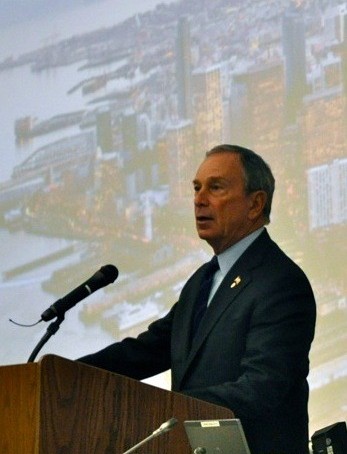 “As mayors — the great pragmatists of the world’s stage and directly responsible for the well-being of the majority of the world’s people — we don’t have the luxury of simply talking about change but not delivering it.”
“As mayors — the great pragmatists of the world’s stage and directly responsible for the well-being of the majority of the world’s people — we don’t have the luxury of simply talking about change but not delivering it.”
That was New York Mayor Michael Bloomberg speaking at the United Nations yesterday. Bloomberg delivered the remarks in his usual flat tone to a vast room filled with blank-faced diplomats, bureaucrats, and international do-gooders. But there was real urgency in the message he was delivering: It’s time to give cities a substantive role in international climate-change negotiations — because national and international governments have been bickering and dithering while disaster is bearing down on them.
Bloomberg, who is chair of the C40 Cities Climate Leadership Group, was speaking as part of a panel put together by the Ford Foundation in advance of the Rio+20 United Nations Conference on Sustainable Development. The conference will be held in Rio de Janeiro in June of 2012, marking the 20th anniversary of the U.N.’s first Earth Summit, which also took place in Rio.
That was supposed to be the beginning of a grand international collaboration to enact meaningful environmental policies. The follow-up at the highest levels of government has been less than decisive (Kyoto Protocol, anyone?).
Meanwhile, the world has been urbanizing more and more rapidly. Today, more than 50 percent of the world’s population lives in cities. The number of people living in poor and densely populated places has grown from 600 million to a billion people since the first Earth Summit.
“How can we ensure that our cities evolve as just cities, shaped by fairness, sustainability, and shared prosperity?” asked the Ford Foundation’s president, Luis Ubiñas. “Rio+20 has to have that conversation — sustainability in the context of justice.”
“Making promises for future leaders to fulfill won’t do at this summit,” said Frances Beinecke, president of the Natural Resources Defense Council, another of yesterday’s panelists. “This must be a summit at which every leader makes concrete commitments about what they are going to do now and in the near term.”
She made the case that meaningful change doesn’t necessarily result from treaties or protocols; it can come from the efforts of action-oriented players at lower levels of government.
“Cities are where most people come face to face with the worst environmental problems, from air pollution to extreme weather brought on by climate change,” said Beinecke. They are also places where real change is happening, she pointed out. “Citywide solutions, like better transit, clean drinking supplies, wastewater treatment, and improved energy efficiency can bring a cleaner environment to millions. All around the world, mayors are putting these solutions in place. As they do so, cities are becoming the incubators of clean development.”
Bloomberg, touting his own achievements in tree-planting, new energy standards, and cleaner transportation, argued that mayors deserve a broader role in the global debate. “Cities should be given seats at the table when international sustainability policies are mapped,” said Bloomberg. “In every corner of the globe, cities are at the forefront of climate change action.” But too often, he said, “cities lack the power, resources, or the expertise to go along the alternative path, the path of sustainability.”
And there are real-world consequences, he emphasized, if cities continue to be disempowered by their national governments. “The harsh reality is, today’s unprecedented urban population explosion is putting the cities of the world, and therefore the future of the world, in a race against time.”
After the panelists had finished their presentations, the assembled functionaries shuffled back out into the halls of the U.N. on their way to the next panel, or maybe to lunch. You had to wonder if they had gotten the message.



